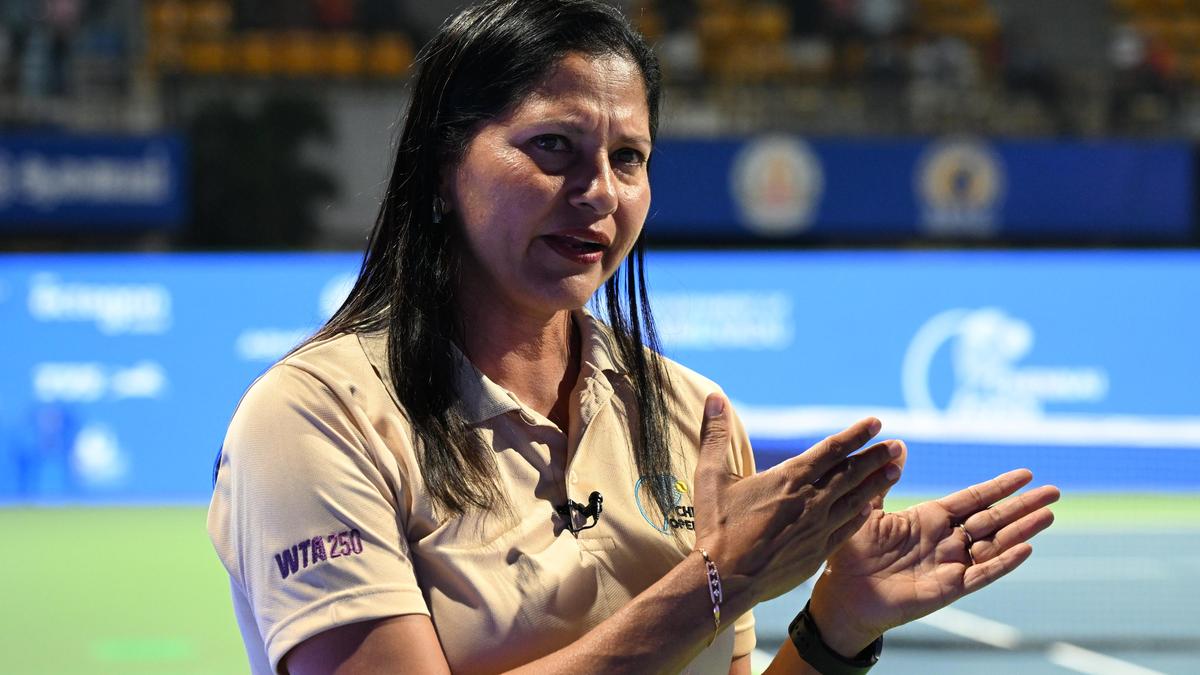Sports
Nirupama Sanjeev Reflects on Coaching and Commentary Journey

At the recent WTA 250 Chennai Open 2025, former Indian tennis player Nirupama Sanjeev showcased her multifaceted expertise in the commentary box. The 48-year-old, renowned for being the first Indian woman to win a round at a Grand Slam during the 1998 Australian Open, discussed her insights as a player, coach, and parent, highlighting the unique perspective she brings to her current roles.
Sanjeev, who has transitioned from a competitive athlete to a commentator and coach, expressed her views on the current state of Indian tennis and the importance of on-court coaching, which was introduced in January this year. “A good coach sitting on the sidelines can make a lot of difference,” she emphasized, drawing from her extensive experience in the sport.
Reflecting on her commentary career, Sanjeev recalled its beginnings during the Gold Flake Open in Chennai in 2000. She later collaborated with Indian tennis icon Vijay Amritraj and commentator Alan Wilkins for major tournaments like Wimbledon and the US Open. After taking a break to support her daughter in her tennis pursuits, who now studies at Johns Hopkins University, Sanjeev returned to commentary, eager to share her insights.
Sanjeev’s coaching journey began with the establishment of Niru’s Tennis Academy in San Jose, California, alongside her brother in 2004. After operating for 19 years, they recently closed the academy but continue to host tournaments in Florida, focusing on United States Tennis Association and UTR events for aspiring professionals.
Her enthusiasm for her second stint as a coach and commentator is palpable. “I just don’t have the perspective of a tennis player; I have the perspective of a coach and a parent,” she explained, underscoring the depth of understanding she has gained through her experiences.
Sanjeev highlighted the evolution of coaching techniques over the years, noting that the landscape has changed significantly since her own playing days. Mentorship from seasoned commentators like Amritraj and Wilkins has shaped her approach. “Hearing them talk, you just learn a lot,” she said, acknowledging the guidance she received early in her career.
At this year’s Chennai Open, Sanjeev noted the competitive field and the impact of weather conditions on tournament outcomes. She expressed particular enjoyment in watching players like Indonesia’s Janice Tjen and Thailand’s Lanlana Tararudee. Sanjeev was also pleased to see Indian players Shrivalli Bhamidipatty and Sahaja Yamalapalli perform well, despite some challenges.
In discussing the performance of Indian athletes, Sanjeev pointed out that a lack of experience at higher levels can hinder their success. She feels that more variety in shot-making and exposure to different playing styles would benefit Indian players in their development.
The conversation turned to the overall state of Indian tennis, where Sanjeev noted improvements but also areas needing attention. “I still think tournament selection should be better for the girls,” she stated, advocating for players to gain confidence through lower-tier competitions before moving to higher-level events.
As the tennis landscape evolves, Sanjeev believes that more opportunities, such as additional WTA 125 and WTA 250 tournaments, could help Indian players improve their skills and rankings. She emphasized the need for a collaborative approach among players and coaches, drawing parallels to the successful models used by countries like Thailand and Indonesia.
On the topic of coaching, Sanjeev asserted the importance of mutual respect between coach and athlete. She is open to coaching but prefers to work with those who are genuinely committed to their development.
When discussing the recent changes in on-court coaching regulations, she noted that the role of a calm and composed coach has become increasingly crucial. “A good coach can make a difference with just a few words,” she remarked, referencing instances where coaching could have altered match outcomes.
Looking to the future, Sanjeev expressed her enjoyment of both commentary and coaching. “I am happy doing that too,” she shared, also mentioning her love for gardening and spending time with her dogs. She aims to balance her professional commitments while staying updated on the latest coaching techniques.
Nirupama Sanjeev also reflected on her time partnering with Rohan Bopanna during the 2010 Commonwealth Games, highlighting the camaraderie and support she experienced. “He is a fantastic person,” she said, wishing him well in his retirement.
As she continues to navigate her roles in tennis, Sanjeev remains optimistic about the future of Indian players and the potential for growth within the sport.
-

 World4 months ago
World4 months agoSBI Announces QIP Floor Price at ₹811.05 Per Share
-

 Lifestyle4 months ago
Lifestyle4 months agoCept Unveils ₹3.1 Crore Urban Mobility Plan for Sustainable Growth
-

 Science4 months ago
Science4 months agoNew Blood Group Discovered in South Indian Woman at Rotary Centre
-

 Sports4 months ago
Sports4 months agoBroad Advocates for Bowling Change Ahead of Final Test Against India
-

 World4 months ago
World4 months agoTorrential Rains Cause Flash Flooding in New York and New Jersey
-

 Top Stories4 months ago
Top Stories4 months agoKonkani Cultural Organisation to Host Pearl Jubilee in Abu Dhabi
-

 Science4 months ago
Science4 months agoNothing Headphone 1 Review: A Bold Contender in Audio Design
-

 Top Stories4 months ago
Top Stories4 months agoAir India Crash Investigation Highlights Boeing Fuel Switch Concerns
-

 Sports4 months ago
Sports4 months agoCristian Totti Retires at 19: Pressure of Fame Takes Toll
-

 Business4 months ago
Business4 months agoIndian Stock Market Rebounds: Sensex and Nifty Rise After Four-Day Decline
-

 Politics4 months ago
Politics4 months agoAbandoned Doberman Finds New Home After Journey to Prague
-

 Top Stories4 months ago
Top Stories4 months agoPatna Bank Manager Abhishek Varun Found Dead in Well









